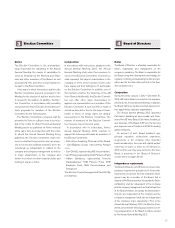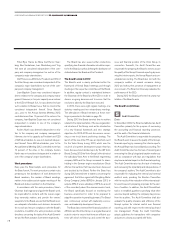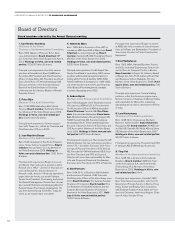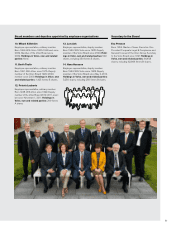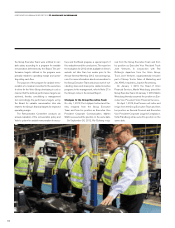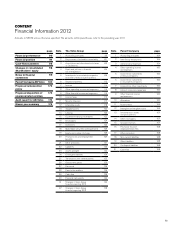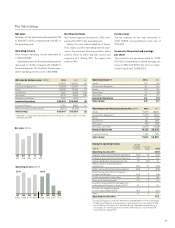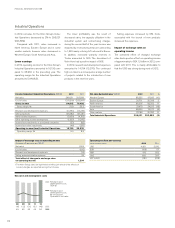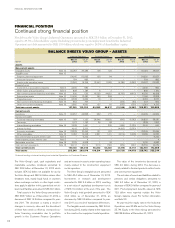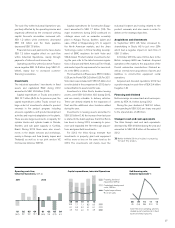Volvo 2012 Annual Report Download - page 91
Download and view the complete annual report
Please find page 91 of the 2012 Volvo annual report below. You can navigate through the pages in the report by either clicking on the pages listed below, or by using the keyword search tool below to find specific information within the annual report.
Internal control over financial reporting
Control environment
Fundamental to Volvo’s control environment is
the business culture that is established within
the Group and in which managers and employ-
ees operate. Volvo works actively on communi-
cations and training regarding the company’s
basic values as described in The Volvo Way, an
internal document concerning Volvo’s business
culture, and the Group’s Code of Conduct, to
ensure that good morals, ethics and integrity
permeate the organization.
The foundation of the internal control process
relating to the financial reporting is based on the
Group’s directives, policies and instructions, as
well as the responsibility and authority structure
that has been adapted to the Group’s organiza-
tion to create and maintain a satisfactory control
environment. The principles for internal controls
and directives and policies for the financial
reporting are contained in Volvo Financial Poli-
cies & Procedures (FPP), an internal document
comprising all important instructions, rules and
principles.
Risk assessment
Risks relating to financial reporting are evalua-
ted and monitored by the Board through the
Audit Committee inter alia through identifying
what types of risks that typically could be consi-
dered as material and where they would typically
occur. The annual evaluation of internal control
activities conducted by the Internal Control and
Corporate Audit functions, is based on a risk-
based model. The evaluation of the risk that
errors will appear in the financial reporting is
based on a number of criteria. Complex accoun-
ting principles can, for example, mean the finan-
cial reporting risks being inaccurate for those
posts that are covered by such principles. Valua-
tion of a particular asset or liability according to
various evaluation criteria can also constitute a
risk. The same is true for complex and/or chan-
ging business circumstances.
Control activities
In addition to the Board of AB Volvo and its
Audit Committee, the management groups and
other decision-making bodies in the business
areas, Group Functions and Group companies
constitute overall supervisory bodies.
Several control activities are applied in the
ongoing business processes to ensure that
potential errors or deviations in the financial
reporting are prevented, discovered and correc-
ted. Control activities range from review of out-
come results in management group meetings
to specific reconciliation of accounts and analy-
ses of the ongoing processes for financial
reporting.
Responsibility for ensuring that control activi-
ties in the financial processes are appropriate
and in accordance with the Group’s policies and
instructions are compiled in the Group’s financial
reporting function. The Group’s shared service
center is responsible for the performance of
control acitvities including the responsibility for
ensuring that authority structures are designed
in accordance with good internal control so that
one person cannot perform an activity and then
perform the control of the same activity. Control
activities within IT security and maintenance
are a key part of Volvo’s internal control over
financial reporting.
Information and communication
Policies and instructions relating to the financial
reporting are updated and communicated on a
regular basis from management to all affected
employees. The Group’s financial reporting fun-
ction has direct operating responsibility for the
daily financial reporting and works to ensure a uni-
form application of the Group’s policies, principles
and instructions for the financial reporting and to
The Board is responsible for the internal con-
trols according to the Swedish Companies Act
and the Code. The purpose of this report is to
provide shareholders and other interested par-
ties with an understanding of how internal con-
trol is organized at Volvo with regard to financial
reporting. The description has been designed in
accordance with the Swedish Annual Accounts
Act and is thus limited to internal control over
financial reporting.
Introduction
Volvo primarily applies internal control princip-
les introduced by the Committee of Sponsoring
Organizations of the Treadway Commission
(COSO). The COSO principles consist of five
interrelated components. These are: control
environment, risk assessment, control activities,
information and communication and follow-up.
Volvo has a specific function for internal con-
trol. The objective of the Internal Control function
is to provide support for management groups
within business areas and Group Functions,
allow ing them to continuously provide solid and
improved internal controls relating to financial
reporting. Work that is conducted through this
function is primarily based on a methodology that
aims to ensure compliance with directives and
policies, and to create effective conditions for
specific control activities in key processes related
to financial reporting. The Audit Committee is
informed of the results of the work performed by
the Internal Control function within Volvo with
regard to risks, control activities and follow-up on
the financial reporting.
Volvo also has an Corporate Audit function
with the primary task of independently monitoring
that companies in the Group follow the principles
and rules that are stated in the Group’s directives,
policies and instructions for financial reporting.
The head of the Corporate Audit function reports
directly to the CEO, and to the Group’s General
Counsel and the Board’s Audit Committee.
87


